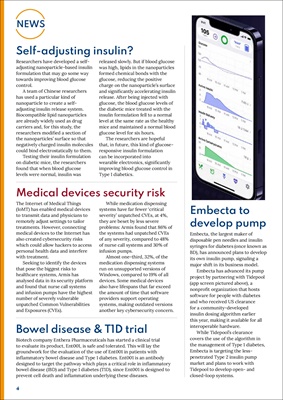
4
NEWS
Embecta to
develop pump
Embecta, the largest maker of
disposable pen needles and insulin
syringes for diabetes (once known as
BD), has announced plans to develop
its own insulin pump, signaling a
major shift in its business model.
Embecta has advanced its pump
project by partnering with Tidepool
(app screen pictured above), a
nonprofit organization that hosts
software for people with diabetes
and who received US clearance
for a community-developed
insulin dosing algorithm earlier
this year, making it available for all
interoperable hardware.
While Tidepool's clearance
covers the use of the algorithm in
the management of Type 1 diabetes,
Embecta is targeting the lesspenetrated
Type 2 insulin pump
market and plans to work with
Tidepool to develop open- and
closed-loop systems.
Self-adjusting insulin?
Researchers have developed a selfadjusting nanoparticle-based
insulin
formulation that may go some way
towards improving blood glucose
control.
A team of Chinese researchers
has used a particular kind of
nanoparticle to create a selfadjusting insulin release
system.
Biocompatible lipid nanoparticles
are already widely used as drug
carriers and, for this study, the
researchers modified a section of
the nanoparticles' surface so that
negatively charged insulin molecules
could bind electrostatically to them.
Testing their insulin formulation
on diabetic mice, the researchers
found that when blood glucose
levels were normal, insulin was
released slowly. But if blood glucose
was high, lipids in the nanoparticles
formed chemical bonds with the
glucose, reducing the positive
charge on the nanoparticle's surface
and significantly accelerating insulin
release. After being injected with
glucose, the blood glucose levels of
the diabetic mice treated with the
insulin formulation fell to a normal
level at the same rate as the healthy
mice and maintained a normal blood
glucose level for six hours.
The researchers are hopeful
that, in future, this kind of glucoseresponsive
insulin formulation
can be incorporated into
wearable electronics, significantly
improving blood glucose control in
Type 1 diabetics.
Medical devices security risk
The Internet of Medical Things
(IoMT) has enabled medical devices
to transmit data and physicians to
remotely adjust settings to tailor
treatments. However, connecting
medical devices to the Internet has
also created cybersecurity risks
which could allow hackers to access
personal health data and interfere
with treatment.
Seeking to identify the devices
that pose the biggest risks to
healthcare systems, Armis has
analysed data in its security platform
and found that nurse call systems
and infusion pumps have the highest
number of severely vulnerable
unpatched Common Vulnerabilities
and Exposures (CVEs).
While medication dispensing
systems have far fewer 'critical
severity' unpatched CVEs, at 4%,
they are beset by less severe
problems: Armis found that 86% of
the systems had unpatched CVEs
of any severity, compared to 48%
of nurse call systems and 30% of
infusion pumps.
Almost one-third, 32%, of the
medication dispensing systems
run on unsupported versions of
Windows, compared to 19% of all
devices. Some medical devices
also have lifespans that far exceed
the amount of time that software
providers support operating
systems, making outdated versions
another key cybersecurity concern.
Bowel disease & T1D trial
Biotech company Enthera Pharmaceuticals has started a clinical trial
to evaluate its product, Ent001, is safe and tolerated. This will lay the
groundwork for the evaluation of the use of Ent001 in patients with
inflammatory bowel disease and Type 1 diabetes. Ent001 is an antibody
designed to target the pathway which plays a critical role in inflammatory
bowel disease (IBD) and Type 1 diabetes (T1D), since Ent001 is designed to
prevent cell death and inflammation underlying these diseases.